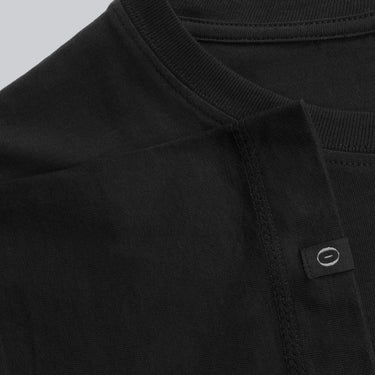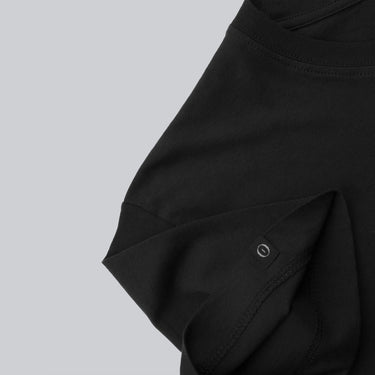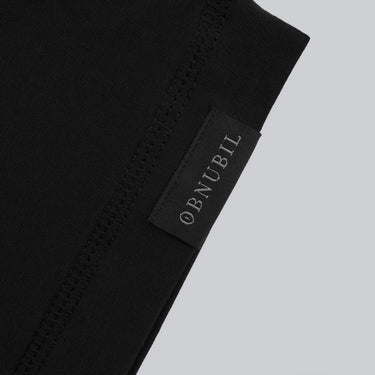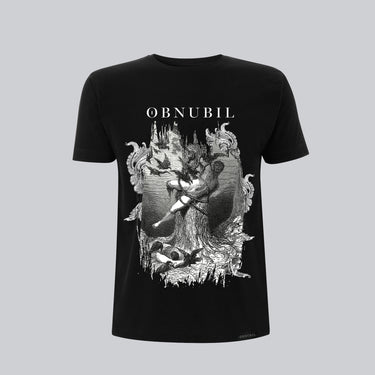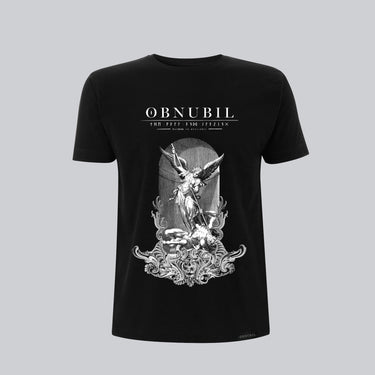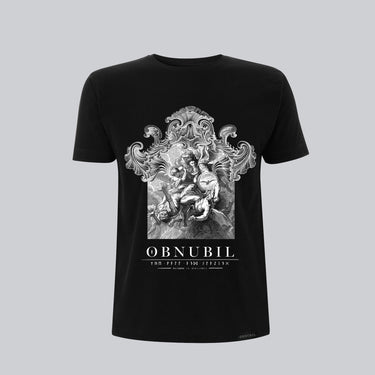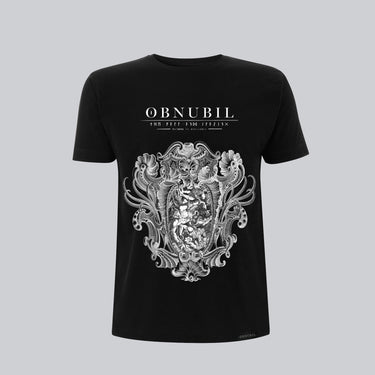
If drumming were an Olympic sport, Eugene Ryabchenko would already have several gold medals—and probably break a snare or two on the podium. Born in Ukraine, carrying Russian and Hungarian roots, and currently based in Vienna, Eugene's multicultural background mirrors the eclectic and high-intensity musical world he inhabits. With bands like Fleshgod Apocalypse or Banisher, he delivers blinding speed, surgical precision, and a sense of drama that feels as much like a high-stakes winter sport as it does extreme metal. In this sharp and invigorating interview, we lace up and hit the metaphorical ice with Eugene—gliding through different topics with a touch of humor. Put on your gloves—this one’s fast, cold, and packed with power.

INTERVIEW
OBNUBIL: Hey Eugene! Thanks so much for taking the time to answer some of these fun and offbeat questions! Let’s start with your musical journey—every drummer has a unique story of how they got started. If we were making a movie about your life as a drummer, what would the most pivotal moments be? Was there a moment where you saw a drumming legend live and thought, ‘That’s it, I want to do that!’ Or was it more like you stumbled upon the drums, picked up a pair of sticks, and thought, ‘Hold on, I can actually do this’?
Eugene: Well, first of all, thank you very much for having me. I appreciate your patience in writing down and asking all these questions—it’s my pleasure. So, let’s get started.
A movie. How did it all begin?
I guess it started with music. I played piano for seven years in music school. Music was always part of my family—my father was a drummer, though he never really taught me much about drumming. After finishing piano school, my digital keyboard just gathered dust for a few years.
Then, one day, my older brother came home and said, “Oh, we’re forming a rock band.” And I was like, Holy shit, this is insane. I want to be part of it—I don’t even care how. It was all about hanging out and making music. And, oh, an electric guitar—it could make these distorted, insane sounds, just like the rock bands I grew up listening to, or the ones my parents loved.
At the very beginning, my brother bought an electric guitar, and we even had a bass. I picked up the bass and played for maybe five minutes before deciding, This is my thing. Want to know why? Because the bass player can stand at the front. I never wanted to be a drummer—drummers are in the back where no one can see them. My ego was already overpowering back then.
Little did I know that in metal—death metal, extreme death metal—drummers eventually become the spotlight.
Later, I showed up at the practice room because the same guys I had been jamming with said, “We actually need a drummer. Maybe you could give it a shot?” Thanks to my piano background, I had a sense of rhythm, so I thought, Alright, let’s try. The moment I sat behind the kit, I was like, Holy shit, this is cool. I can actually do this. That was the very, very beginning.
As I kept learning, I would listen to music and try to replicate it—no teacher, no tutorials, nothing. The internet wasn’t what it is today. I just listened to bands like Rammstein (I was a huge fan), Korn, Metallica, Sepultura... and then Slipknot came along with their fast double bass. I thought, What the hell? This is impossible. It was a huge inspiration for me, and I kept mimicking and mimicking.
Later, when tutorials became available online, learning became much easier. Over the years, I played in different bands, trying to jam with as many musicians as possible to gain experience and improve my skills. I realized there was a big demand for good drummers, so I figured, If I get good enough, I’ll have plenty of offers, and then I can be picky and do what I actually love.
That’s how my career unfolded. Eventually, social media—YouTube, Instagram—played a huge role. People started writing to me, sending offers, and things took off from there.
At least, that’s the big picture.

OBNUBIL: Every drummer has at least one moment where their gear takes a hit in a completely unexpected or comical way. What’s the most memorable disaster you’ve had with your drum gear? Maybe a cymbal went flying into the crowd, or a drumhead cracked at the worst time? Or has a specific piece of your gear, like a drum throne or snare, met an untimely end that still brings a laugh—or a cringe—to this day? Have you ever had a moment where your body decided to betray you mid-show—like a cramp, an unexpected stick launch, or a total "why is my foot not working?" crisis?
Eugene: Malfunctioning equipment? Absolutely. It happens to everyone. The longer you play, the more likely it is to happen.
One of the more recent incidents I experienced was actually a super cool story. As soon as we started the first song, my right pedal beater snapped in half. It was completely my fault—I know exactly why it happened. But at that moment, it didn’t matter. The soundcheck had gone perfectly fine, and the previous shows had been smooth.
So, with my beater broken, I had to play the first two songs almost entirely with my left foot. The right pedal was still firing because of my trigger setup (technical detail—doesn’t really matter), but I had to improvise on the fly.
Luckily, my girlfriend was there. As soon as it happened, I started screaming for her—“Come here! Come here!” She ran behind the kit, and I yelled, “Go to the sound engineer and tell him to stop the show!” Since he controls the entire production, he was the only one who could pause everything. But before we could do that, the second song had already started.
At that point, I just accepted the situation. I was laughing, shrugging, and thinking, Well, there’s nothing I can do now—I might as well just enjoy it. After the second song, we finally stopped, and it only took me a minute or two to replace the broken beater. That was it. Crisis over.
Honestly, I think moments like these are incredibly valuable for musicians who play hundreds of gigs a year. I’ve said this before and will say it again: most gigs feel the same. When you’re on a continuous tour, it becomes a routine. At some point, you almost hope something insane happens—like a beater snapping in half—just to make the night stand out.
And you know what? The crowd actually appreciates it. They get to experience a unique moment with you, something that doesn’t happen at any other show. So, I don’t see these moments as unprofessional or embarrassing—it’s actually the opposite.
Now, about mental blocks, cramps, or crisis moments—yes, they happen. But I don’t think mental blocks come out of nowhere. You’ll be on tour, playing shows every night, everything seems fine... and then suddenly, you have one disastrous gig. And then it’s over.
More often, though, these struggles creep up gradually—longer phases where your playing just doesn’t feel right, and you have no idea why. And the worst part? There’s no point in fighting it. Sometimes, all you can do is ride it out and trust that it’ll pass—because it always does. Nothing lasts forever, not even the worst performance slumps.
I’ve met so many drummers who have gone through this. They’re technically brilliant, incredible performers, and yet—out of nowhere—they go through a phase where they feel like they can’t play at all. They go back to basics, questioning everything.
But I’ve come to believe these moments are actually a transition phase—a sign that you’re about to level up. It’s like a second puberty for musicians. And every time I’ve come out of a slump, my drumming has felt more effortless and powerful than ever.
So, when these moments hit, don’t panic. Something big might be right around the corner.
OBNUBIL: A secret underground sports organization wants to recruit you for an elite team of ice-cold warriors. The only test? You must complete a full Fleshgod Apocalypse set while sitting in a bathtub filled with ice cubes and live piranhas. How long do you last, and what’s your negotiation tactic to swap out the piranhas for something slightly less deadly?
Eugene: Okay, so this sounds like a completely absurd situation—one I hope I never actually find myself in. But if I do, let me tell you: lately, I’ve become somewhat of a cold exposure enthusiast. Ice cubes? They don’t bother me at all.
As long as there’s no water and it’s just solid ice cubes, I think I’d be fine. If the fish can’t swim, they’re not much of a threat. In fact, they’d probably freeze and die long before I do.
But if I had to swap the piranhas for something, it would have to be something that melts the ice. Because let’s be real—there’s nothing worse than playing with ice-cold hands or a freezing body. Playing in the winter is rough enough. Sometimes, even warming up your hands before a Fleshgod set takes forever, and even then, it doesn’t always help. Good blood circulation is everything.
So, what would I pick? McDonald’s apple pie. Because the inside of that thing is literally lava. There is absolutely no way to bite into one without burning your tongue. If anything can melt ice and warm me up, it’s that. And with warm hands, I’d actually have a shot at pulling off the set.
How’s that for an answer, huh?
OBNUBIL: You’ve been asked to train a team of penguins for a new winter sport called “Arctic Blast Beat Racing.” What ridiculous drills do you put them through, and which penguin develops a rebellious attitude toward your training methods?
Eugene: I see another question related to ice and cold. First of all, I’ll be a smartass and say that penguins will need some kind of training because they’re not accustomed to anything in the Arctic—they live in the Southern Hemisphere. However, since they are already cold-resistant, I don’t think any advice about cold showers or cold plunges will be useful for them. If anyone needs to learn, it’s me—taking notes from their example.
When it comes to drumming for blast beats, you can find plenty of resources on YouTube. Typically, you’d engage in continuous endurance workouts, practice a single-stroke roll at a moderately comfortable tempo, and incorporate interval training with fast sprints, bursts of rapid rolls, followed by a slowdown and repetition. Nothing extraordinary. Of course, performing these exercises in the cold is challenging, but perhaps not for penguins—I have no clue.
The penguin that might actually rebel against my training methods would probably be the exact opposite of my own approach. I like to be pushed, not bullied, but challenged to my limits by people who motivate and inspire me—people who believe in me more than I believe in myself and who can squeeze out one extra rep when I feel I can’t do it. Unfortunately, I’ve met some people who do the bare minimum, who are lazy, and who always look for excuses not to do their best. I have very little patience for that kind of attitude, and if any penguin were to rebel against me, it would certainly be one with that mindset.
OBNUBIL: You’ve just finished an intense tour, and you have to take part in a “Drumming Ironman”—you need to play a song with blast beats, odd-time signatures, and polyrhythms, but with physical challenges, like running between parts of the kit or balancing on one foot while drumming. What’s your game plan to win this insane event?
Eugene: Every now and then, I see drummers using this Pearl drum rack setup—two horizontal bars with extended, tall vertical pipes—that makes the entire kit look like a massive cage. Great examples include Dream Theater, Mayhem, and more recently, Behemoth.
Lately, I’ve been having this wild fantasy of getting that kind of rack for my home kit someday. But not just for drumming—I’d use it like one of those pull-up bar cages you see in gyms, turning it into a kind of performance zone for calisthenics and gymnastics. Picture this: I’m hanging by one arm like a monkey, hitting the drums with my free limbs, and doing pull-ups mid-performance. It would look absolutely wild.
OBNUBIL: You’re given the chance to perform a drum solo on the Moon, but there’s one problem: gravity is way lower than on Earth. What ridiculous adjustments do you have to make to your technique to keep everything from floating away? Also, on the other hand, aliens landed on Earth and demanded that you teach them metal drumming as their first introduction to Earth’s culture. What's the first thing you’d teach them and why?
Eugene: Back in 2024, during the 70000 Tons of Metal cruise, I was bragging a bit on social media about how well I managed to stabilize my drum kit on the ship’s pool deck—despite the insane wind and the boat rocking like crazy.
My trick? Either go the Sabaton route and use heavy sandbags, or just assemble the full kit and load it up with as much hardware as possible to make it heavier than it needs to be. That cage-like drum rack I mentioned earlier might actually help with that too, ha! I would even wear a weight vest myself for extra stability.
If I ever had to teach aliens a bit of human wisdom, the first thing I’d tell them (and it’s advice I give a lot of my students, especially beginners) is this: form a band with friends and just focus on having fun first. Jam songs, try to mimic other musicians or bands—no matter how rough you sound in the beginning. That joy and excitement is what pushes you to improve, clean up your playing, and build your technique. Diving straight into rudiments, drills, and metronome torture with no soul can kill your enthusiasm fast—and might even make you give up on music entirely.
OBNUBIL: Picture this: your drum kit becomes a time machine, and you’re sent back to a key event in history. Where do you go, and what role would your drumming play in shaping that moment? Would you join an ancient war band, or maybe drum through the final hours of a lost civilization? Would you be there for the first time rock music exploded onto the scene, or would you drum through a major historical turning point, like the discovery of fire?
Eugene: I’d go with that classic internet meme: jump into my time machine, zoom back to the Beatles at their peak, and hand Ringo Starr a set of triggers and a Czarcie Kopyto double pedal. I’d grin, say “Here—try this,” and demonstrate double strokes and blast beats. Then I’d vanish without a trace and watch the rock world erupt into an entirely new, gloriously chaotic timeline.
OBNUBIL: If you had to compare your drumming style to a type of food, what would it be? Would it be something carefully crafted with lots of different elements, like a fine dining experience, or would it be a bold, no-holds-barred street food dish that packs a punch? And if you could have any drummer from history join you for a meal to talk shop and share stories, who’s getting a seat at the table?
Eugene: My drumming as a meal—one of these variations:
• Chicken, rice, broccoli
(All the healthy macros; joy and soul optional.)
• Homemade protein ice cream
(Healthy and delicious.)
• Something fat and greasy—peanut butter or the nastiest pizza you can find.
(Junk food that makes you go full on stank face grimace like you’re powering through the heaviest breakdown or an insanely fast kick section.)
If I could invite any drummer from history—especially those early rock and metal legends who spent their prime years drinking, doing drugs, surviving on terrible food and no sleep, and pounding away with sketchy technique—I’d sit them down, talk some sense into them, and show them how a healthier lifestyle can extend their careers. In 2025, exercise, clean eating, and mental‐health work are the new “sex, drugs, and rock ’n’ roll.” Even veteran musicians are leaning into this healthier ethos, which is both encouraging and optimistic. These are definitely the good addictions to have.
OBNUBIL: If you could combine the best qualities of different legendary drummers to create the ultimate drumming machine, whose skills would you borrow? Maybe you'd take the groove of a Bonham, the precision of a Dave Lombardo, the technical prowess of a Tomas Haake, or the ferocity of a Danny Carey? Once you’ve pieced together this unstoppable force, do you think you’d still be able to take them on in a drum-off and come out victorious?
Eugene: If I could build the ultimate drum machine, it would be a Frankenstein fusion of the qualities I admire most in the drummers who’ve inspired me:
• The long hair of Kerim “Krimh” Lechner (Septicflesh)
• The windmilling chaos of Joey Jordison and the raw animalistic power of Eloy Casagrande (Slipknot)
• The posture, control, and laser focus of John Longstreth (Origin)
• The playful creativity of Ray Luzier (Korn) and Travis Barker (Blink-182)
• The unstoppable drive, workaholism, and relentless optimism of Francesco Paoli (Fleshgod Apocalypse)
• The stage energy, muscles, and charming smile of Eugene Ryabchenko (yes, had to take the chance to be the narcissistic dick)
Honestly, I wouldn’t stand a chance against any one of them individually—let alone this monstrous hybrid of all of them combined.
OBNUBIL: Drummers spend a ridiculous amount of time sitting. If someone designed a “drummer’s throne” that doubled as something completely absurd—like a massage chair, a snack dispenser, or a built-in espresso machine—what ridiculous feature would you want on yours?
Eugene: If I were designing the most absurdly over‐the‐top drum throne, it’d look like this:
• Multifunctional cable tower with an integrated Smith machine and adjustable bench that doubles as an espresso dispenser (because caffeine is life).
• Built‐in supplement and snack station—protein bars, powders, you name it.
• On‐demand massage function to knead out those drum‐induced knots.
• An ice‐cold plunge tub for post‐solo recovery.
• And, of course, an integrated gaming console (PS5, naturally) so I can queue up a quick match between takes.
Ridiculously unrealistic? Absolutely. But hey, a drummer can dream!
OBNUBIL: Imagine leaving a single drumstick behind for future drummers to uncover a century from now. What would you write on it? Would it be a piece of drumming wisdom or maybe something offbeat and fun, like a quirky warning or a strange message to make them smile? Would you throw in something completely random like, ‘Warning: This stick will make you groove uncontrollably?
Eugene: I can stretch one pair of sticks for half a tour, so I’d carve a mantra into them:
“Play smarter. Play softer. Protect your gear.”
Then I’d wrap each stick in grip tape and add a friendly note:
“Give this a try—your feel for the stick will never be the same.”
This little reminder encourages drummers to preserve their equipment, break sticks less often, and rethink how they connect with their gear.
OBNUBIL: If you could meet your younger self at the start of your drumming journey, what would you tell him? Would you share a life-changing piece of advice to save him from rookie mistakes, warn him about the physical toll of drumming, or maybe just give him a heads-up that double bass pedals are going to become his best friend? What’s one thing you wish someone had told you back then?
Eugene: If I could tell my younger self—and anyone else who needs this—never hold back from reaching out and making connections. Opportunities rarely just knock on your door; they’re often hiding behind a single message. The only thing standing in your way is fear: “What if they’re busy? What if they don’t need me?” Newsflash: they’re wondering the same about you. So put yourself out there, make it clear you’re open to collaborations and new opportunities. After all, people need to be reminded more than they need to be taught.

OBNUBIL: To finish off, I’d love to hear about what the future holds for you. Are there any exciting projects, collaborations, or upcoming releases that you’re currently working on? Anything followers should keep an eye out for in the near future?
Eugene: 99% of everything I do ends up on my social media, especially Instagram and YouTube—those are the platforms where I’m most active. If you follow me there, along with all the official Fleshgod Apocalypse announcements, you’ll be fully in the loop.
I’m constantly editing and creating new videos, which I genuinely love doing. I also continue recording drums in different studios and teaching regularly. Got some exciting announcements coming up in the next few weeks and months—so stay tuned!
OBNUBIL: It’s been an absolute pleasure getting to learn more about you, Eugene! Thank you so much for sharing your time and thoughts. Before we wrap up, is there anything you'd like to share with the readers or a message for your followers?
Eugene: Thank you so much for taking the time and putting together this interview—the questions were incredibly creative and refreshingly unique. It was truly a pleasure. Big thanks to everyone who stuck around and read through the whole thing—I appreciate you all more than you know.
See you out on the road or online. Take care of yourselves and stay healthy.
Eugene out.
Interview done April 2025. Photos by Nachtfrost Visuals (cover), Artur Tarczewski & Chris Klumpp.



